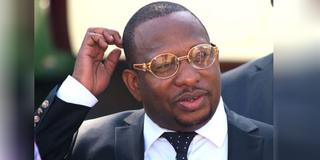Supreme Court quashes Sonko bid to reopen impeachment case

Former Nairobi Governor Mike Sonko.
The Supreme Court has declined a request by former Nairobi governor Mike Mbuvi Sonko to reopen a lawsuit on his impeachment and allow him to introduce fresh evidence.
Mr Sonko wanted the court to permit him to adduce additional evidence in the form of videos and audio recordings pertaining alleged malpractices by Judge Juma Chitembwe, who presided over his case at the High Court.
He also wanted to adduce audio and video recordings of Chief Justice Martha Koome during an interview at Spice FM, in which she allegedly made comments about his appeal that was pending determination at the Supreme Court.
He said the CJ expressed her views on the impeachment that was directly related to him. In addition, Mr Sonko wanted the Supreme Court to review and set aside its judgment of July 15, 2022, in which the judges upheld his impeachment from the office of governor of Nairobi.
But the court threw out his request upon finding that he failed to meet the threshold set in the Supreme Court Rules, 2020, for adducing additional evidence.
“Mr Sonko has not explained the relevance of the so-called new evidence considering that what was before the court was his removal from office, whose evidence was quite different from the conduct of Justice Chitembwe,” said the seven-judge bench of the Supreme Court.
Led by CJ Koome, the judges added that Mr Sonko’s petition before the High Court was heard by a bench of three judges and further that the Court of Appeal upheld the conclusion by the High Court.
The court further noted that Mr Sonko was all along aware of the material he was seeking to introduce post-judgment of the suit.
“At the time he lodged the appeal in the Court of Appeal and even in this court, he was well aware of the gazette notice of May 18, 2022 in which a tribunal was appointed to investigate the conduct of Justice Chitembwe,” the court said.
The material sought to be introduced, videos and audio recordings over alleged malpractices by Justice Chitembwe, are the very subject of the tribunal’s investigations, the court said.
In addition, they added that the veracity of audio and video recordings of an interview of the CJ was determined in the court’s ruling of July 14, 2022.
Regarding his request for review or setting aside of the court’s judgment, the judges said the prayer was the subject of a separate ruling to his application over the same.
On his request for suspension of the court proceedings pending the outcome of the Justice Chitembwe’s tribunal, the Supreme Court told Mr Sonko that it had delivered its judgment determining with finality his appeal contesting his ouster as governor.
“There are no proceedings capable of being stayed that are pending before the court,” the court said in the ruling rendered by the CJ, her deputy Philomena Mwilu and justices Mohamed Ibrahim, Smokin Wanjala, Njoki Ndung’u, Isaac Lenaola and William Ouko.
The Clerk of the Nairobi County Assembly had opposed Mr Sonko’s bid, saying the evidence he sought to introduce was irrelevant and was not the subject matter of his removal from office. Hence their introduction would not have any impact upon the judgment of the court even if admitted.
It was stated that the matters raised in the application were before the tribunal, where their determination is pending.
Mr Sonko had explained that he had planned, prior to the hearing of the appeal in the Supreme Court, to present the application but due to the confusion created by the court’s registry and the tight timelines, he was not able to do so.
The court upheld his impeachment of July 15, 2022 upon finding that he was properly removed from office, since the impeachment proceedings before the county assembly and the Senate were properly conducted.
“We come to the irresistible conclusion that the impeachment of the appellant was in compliance with the Constitution and the law. We therefore find no merit in the Petition of Appeal. It bears mentioning in conclusion that Chapter Six of the Constitution was not enacted in vain or for cosmetic reasons,” said the Supreme Court.





